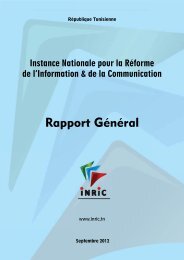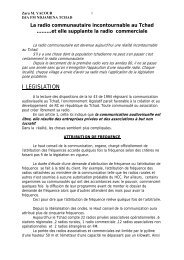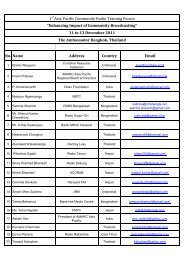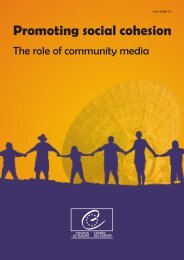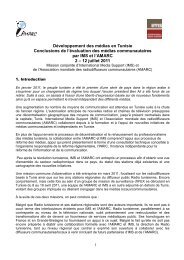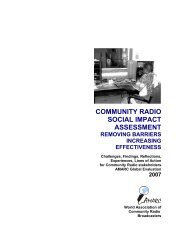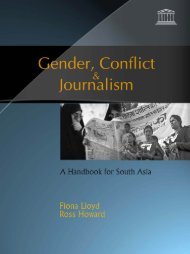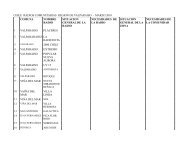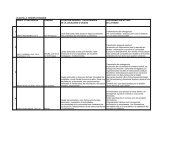Women's Empowerment and Good Governance Through - amarc
Women's Empowerment and Good Governance Through - amarc
Women's Empowerment and Good Governance Through - amarc
You also want an ePaper? Increase the reach of your titles
YUMPU automatically turns print PDFs into web optimized ePapers that Google loves.
49<br />
Best Experiences for an Action Research Process<br />
is slowing down access to employment opportunities. Only women from affluent backgrounds<br />
have access to managerial positions while the majority still occupy low-level positions such as<br />
domestic, cleaning, <strong>and</strong>, of late, security duties.<br />
• Apathy of women for the programs that promote social change is another challenge that delays<br />
women’s empowerment. For example, when advertisement for positions get publicized,<br />
they are made explicitly clear that preference would be given to women as a previously disadvantaged<br />
group, but the majority of people responding to these advertisements are men.<br />
In addition, the majority of women who respond <strong>and</strong> make it for interviews lack confidence as<br />
a result of traditional practices that place women as inferior to men. The laws that are put in<br />
place are not enough to accelerate progress in putting women on par with men since “mind<br />
change” on the side of women cannot happen overnight.<br />
• Lack of support for <strong>and</strong> confidence in women by women also play a large part in the failure<br />
to achievegender equality. Most obstacles that women face are not exactly in the system but<br />
are engrossed within women themselves who still doubt their capacity <strong>and</strong> capabilities <strong>and</strong><br />
who still believe in being led by men. For example, women in South Africa make up 52 per<br />
cent of the population <strong>and</strong> there are 1.2 million more on the voters’ roll than men. Considering<br />
these statistics, women can use their collective power in voting for women in order to<br />
access the political power. Instead, when the ruling party recently went through the process<br />
of nominating the new leadership in preparation for the country’s elections in 2009, the ruling<br />
party’s women’s league nominated only men for the positions of President <strong>and</strong> Deputy President<br />
despite the fact that they had possible c<strong>and</strong>idates who occupy influential positions in the<br />
Cabinet. Unfortunately, this trend is worse in the case of the private sector, including media<br />
organizations, where women’s representation is poor.<br />
• Poverty <strong>and</strong> lack of financial assistance are the greatest contributors to gender inequality.<br />
South Africa developed a “Black Economic <strong>Empowerment</strong>” policy meant to provide business<br />
opportunities to previously disadvantaged groups, of which women are prioritized as the most<br />
deserving group. Be that as it may, the social <strong>and</strong> economic battles for women are far from<br />
over. Women lack capital to guarantee them access to financial assistance <strong>and</strong> need male<br />
guarantors to secure funding for start-up businesses. Lack of capital <strong>and</strong> financial dependence<br />
on men make women highly vulnerable to emotional <strong>and</strong> physical abuse, including rape <strong>and</strong><br />
other forms of violence against women. While awareness programs driven by women net-



